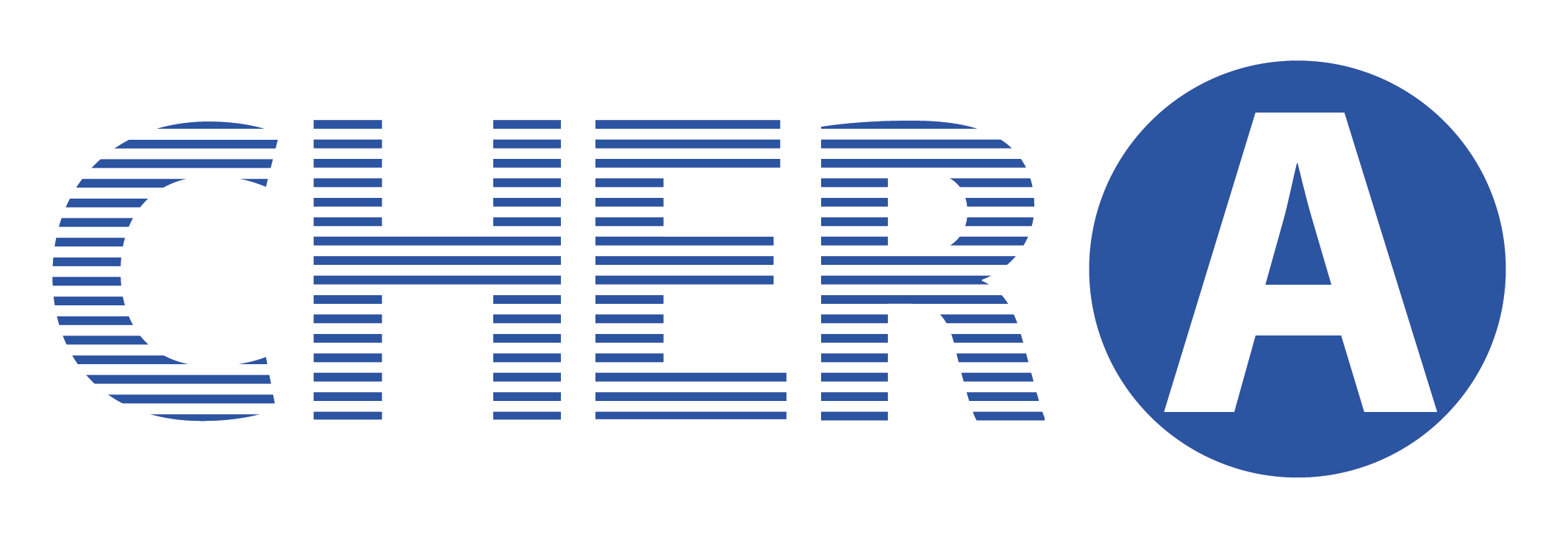
MEd Capstone Projects 2024-2025: Higher Education Specialism
MEd Capstone Projects 2024-2025: Higher Education Specialism
Upcoming seminars
Key Trends and Challenges in International Higher Education and its implications for the meaning and direction of its internationalisation.

Upcoming seminar: Key Trends and Challenges in International Higher Education and Its Implications for the Meaning and Direction of Its Internationalisation
Date: 3rd December, 2025
Time: 10:30am – 12:00pm
Mode: RMS204, Runme Shaw Building, HKU & Zoom
Speaker: Hans (J.W.M.) de Wit, Emeritus Professor, Boston College
Chair: 杨力苈, Assistant professor, The University of Hong Kong
Registration link: https://hku.au1.qualtrics.com/jfe/form/SV_er1OMn8ZyjqtLHo
Abstract:
Higher education globally over the past 3 decades has seen a rise in massification, support and innovation. The competitive environment of the knowledge economy has stimulated higher education in high- and middle-income countries. Excellence initiatives, rankings and more funding for research in these countries have had a positive impact on higher education and international collaboration, although at a high cost of inequality between the top universities and the rest of the system and between low-income countries and the other two. Although the dominance of the Global north continued, some of the middle-income countries increased their reputation and scientific performance, in particular but not exclusively China. Bur nationalism, anti-educational sentiments and geopolitical tension are on the rise. What does this mean for higher education and is the impact different by region? What does it mean for internationalisation of education, research and services?
About the speaker:
Hans de Wit is Distinguished Fellow of the ‘Center for International Higher Education’ (CIHE) at Boston College, USA, and Emeritus Professor of the Practice in International Higher Education, Boston College. From 2015-2020 he was full-time director of CIHE.
He is IAU Senior Fellow by the International Association of Universities (IAU).
He is a Scientific Committee member and teaches in the Higher Education Leadership and Management Doctor of Business Administration (DBA), Luiss Business School, Rome/Amsterdam.
He is the Founding Editor of the ‘Journal of Studies in International Education’ (Association for Studies in International Education/SAGE), Co-Editor of the journal Policy Reviews in Higher Education (SRHE), and Co-Editor of the CIHE journal International Higher Education.
He has been involved in quality reviews of internationalisation strategies and of internationalisation as part of institutional and national quality reviews around the globe. He is author of many books, academic articles and blogs/essays on internationalisation in higher education.
What Is University For? How Students Reimagine Higher Education in Russian Universities
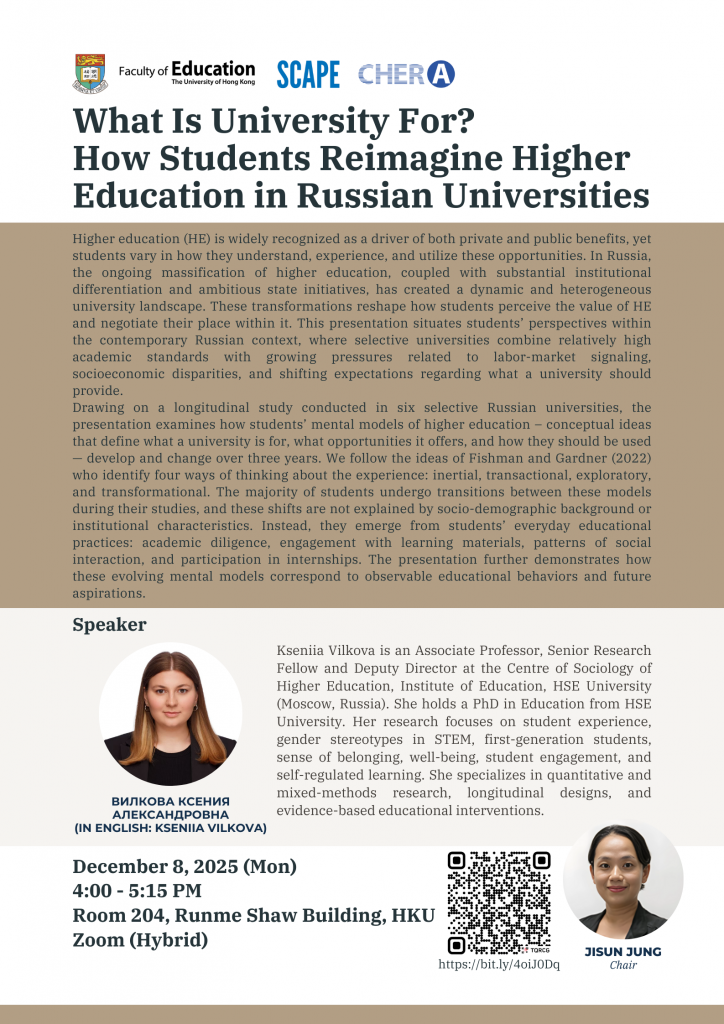
Upcoming seminar: What Is University For? How Students Reimagine Higher Education in Russian Universities
Date: 8th December, 2025
Time: 4:00 -5:15 pm
Mode: RMS204, Runme Shaw Building, HKU & Zoom
Speaker: Kseniia Vilkova, Associate Professor, HSE University
Chair: Jisun Jung, Associate Professor, The University of Hong Kong
Registration link: https://hku.au1.qualtrics.com/jfe/form/SV_6WG5NpeaQqj66A6
Abstract:
Higher education (HE) is widely recognized as a driver of both private and public benefits, yet students vary in how they understand, experience, and utilize these opportunities. In Russia, the ongoing massification of higher education, coupled with substantial institutional differentiation and ambitious state initiatives, has created a dynamic and heterogeneous university landscape. These transformations reshape how students perceive the value of HE and negotiate their place within it. This presentation situates students’ perspectives within the contemporary Russian context, where selective universities combine relatively high academic standards with growing pressures related to labor-market signaling, socioeconomic disparities, and shifting expectations regarding what a university should provide.
Drawing on a longitudinal study conducted in six selective Russian universities, the presentation examines how students’ mental models of higher education – conceptual ideas that define what a university is for, what opportunities it offers, and how they should be used — develop and change over three years. We follow the ideas of Fishman and Gardner (2022) who identify four ways of thinking about the experience: inertial, transactional, exploratory, and transformational. The majority of students undergo transitions between these models during their studies, and these shifts are not explained by socio-demographic background or institutional characteristics. Instead, they emerge from students’ everyday educational practices: academic diligence, engagement with learning materials, patterns of social interaction, and participation in internships. The presentation further demonstrates how these evolving mental models correspond to observable educational behaviors and future aspirations.
About the speaker:
Kseniia Vilkova is an Associate Professor, Senior Research Fellow and Deputy Director at the Centre of Sociology of Higher Education, Institute of Education, HSE University (Moscow, Russia). She holds a PhD in Education from HSE University. Her research focuses on student experience, gender stereotypes in STEM, first-generation students, sense of belonging, well-being, student engagement, and self-regulated learning. She specializes in quantitative and mixed-methods research, longitudinal designs, and evidence-based educational interventions.
Higher Education in Hong Kong: Present and Future
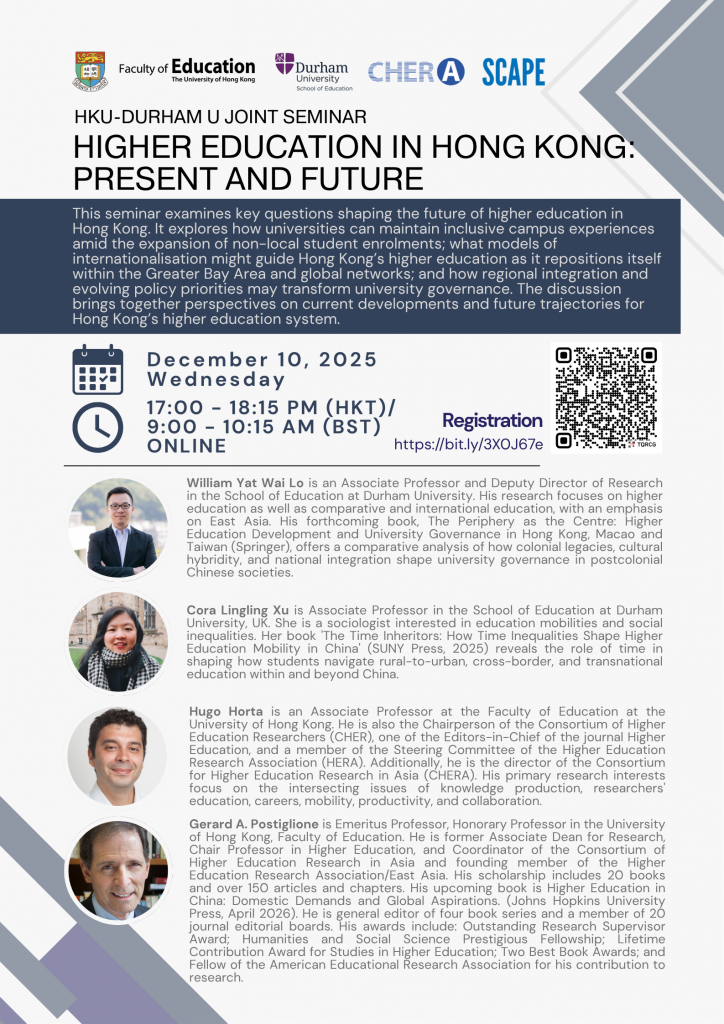
Date: December 10th
Time: 17:00 to 18:15 (HKT) and 9:00 to 10:15 (BST)
Mode: Online by Zoom
Speakers: Prof. William Yat Wai (Durham University); Prof. Cora Lingling Xu (Durham University)
Chair: Prof. Hugo Horta (University of Hong Kong); Gerard A. Postiglione (University of Hong Kong)
Registration link: https://hku.zoom.us/meeting/register/chbJdi72SjqidurqCxYASQ
Abstract:
This seminar examines key questions shaping the future of higher education in Hong Kong. It explores how universities can maintain inclusive campus experiences amid the expansion of non-local student enrolments; what models of internationalisation might guide Hong Kong’s higher education as it repositions itself within the Greater Bay Area and global networks; and how regional integration and evolving policy priorities may transform university governance. The discussion brings together perspectives on current developments and future trajectories for Hong Kong’s higher education system.
About the speakers:
William Yat Wai Lo is an Associate Professor and Deputy Director of Research in the School of Education at Durham University. His research focuses on higher education as well as comparative and international education, with an emphasis on East Asia. His forthcoming book, The Periphery as the Centre: Higher Education Development and University Governance in Hong Kong, Macao and Taiwan (Springer), offers a comparative analysis of how colonial legacies, cultural hybridity, and national integration shape university governance in postcolonial Chinese societies.
Cora Lingling Xu is Associate Professor in the School of Education at Durham University, UK. She is a sociologist interested in education mobilities and social inequalities. Her book ‘The Time Inheritors: How Time Inequalities Shape Higher Education Mobility in China’ (SUNY Press, 2025) reveals the role of time in shaping how students navigate rural-to-urban, cross-border, and transnational education within and beyond China.
Intercultural research capability in the age of gen AI: Preparing PhD graduates for transcultural knowledge co-construction
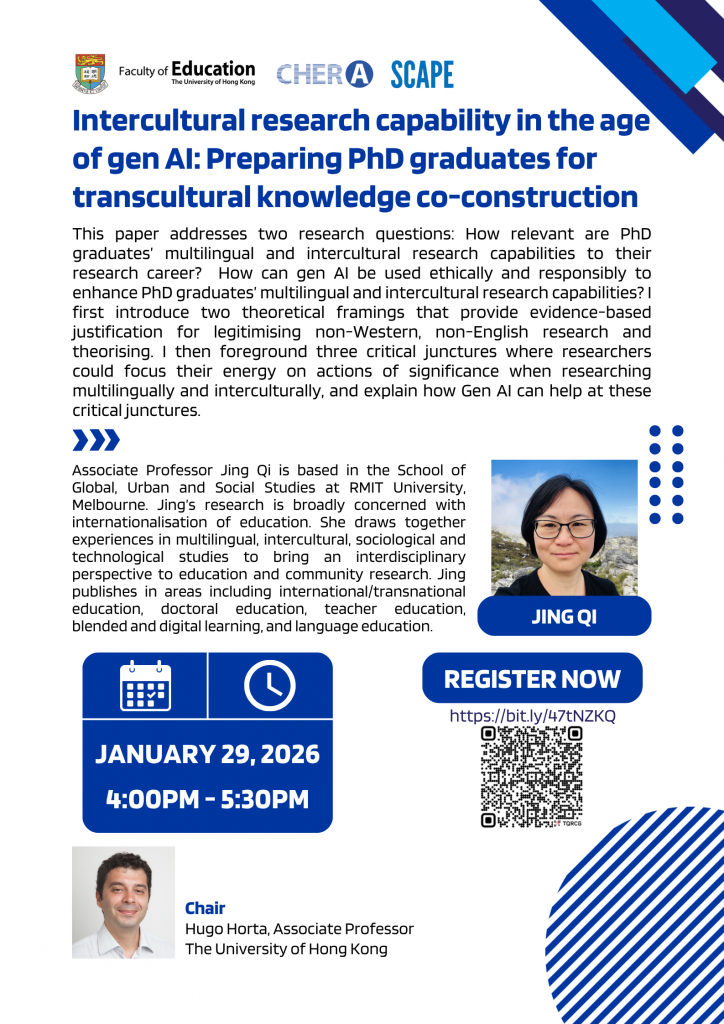
Date: 29th January, 2026
Time: 4:00pm until 5:30pm
Mode: Online by Zoom
Speaker: Prof. Jing Qi, School of Global, Urban and Social Studies, RMIT University, Melbourne
Chair: Prof. Hugo Horta, Faculty of Education, The University of Hong Kong, Hong Kong
Registration link: https://hku.zoom.us/meeting/register/uZLAyzFLRCOcf6DrUNxd2g
Abstract:
This paper addresses two research questions: How relevant are PhD graduates’ multilingual and intercultural research capabilities to their research career? How can gen AI be used ethically and responsibly to enhance PhD graduates’ multilingual and intercultural research capabilities? I first introduce two theoretical framings that provide evidence-based justification for legitimising non-Western, non-English research and theorising. I then foreground three critical junctures where researchers could focus their energy on actions of significance when researching multilingually and interculturally, and explain how Gen AI can help at these critical junctures.
About the speaker:
Associate Professor Jing Qi is based in the School of Global, Urban and Social Studies at RMIT University, Melbourne. Jing’s research is broadly concerned with internationalisation of education. She draws together experiences in multilingual, intercultural, sociological and technological studies to bring an interdisciplinary perspective to education and community research. Jing publishes in areas including international/transnational education, doctoral education, teacher education, blended and digital learning, and language education.
香港大學世紀之問 —— 改革開放初期與內地交流的人和事
HKU in the Early Days of Reform and Opening-up

| 《香港大學世紀之問 —— 改革開放初期與內地交流的人和事》 HKU in the Early Days of Reform and Opening-up |
| 主編:陳婉瑩 Editor-in-chief: Ying Chan 出版:三聯書店(香港)有限公司 Publisher: Joint Publishing (H.K.) Co., Ltd. |
| This book tells the story of 18 individuals who pioneered academic and professional exchanges between HKU and mainland China in the 1980’s. These men and women blazed the trail in eight sectors, medicine, engineering, literature and history, education, architecture, social work, law, and city planning, with expertise and dedication. Our CHERA members, Professors Gerard A. Postiglione and Cheng Kai Ming, actively engaged in exchange and communication with the mainland during the Reform and Opening-up period. They are prominently featured in the book with documents, stories, analysis, and photos. |
Jamil Salmi (ed.) (2023). Transforming Lives at the Institutional Level: Equity Promotion Initiatives Across the World
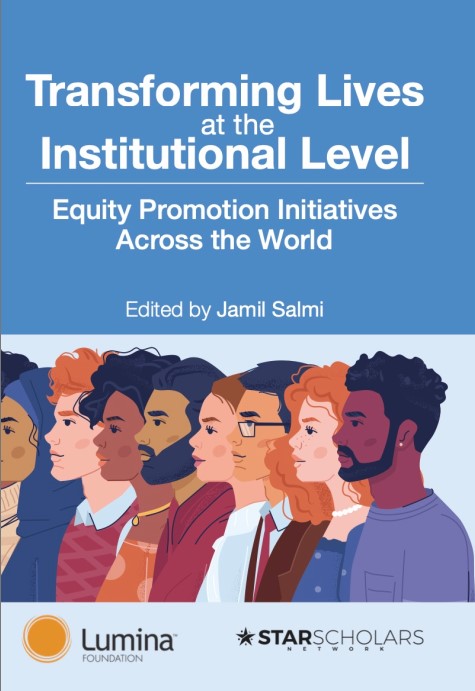
In the ever-evolving landscape of global education, the quest for equitable access to quality higher education remains a pressing challenge. Across the world, countless children and young individuals confront daunting circumstances that impede their educational opportunities due to factors such as race, gender, socioeconomic background, and geographical origin. This particularly affects those in developing countries and marginalized groups globally. To address this issue, promoting inclusivity and pluralism within higher education institutions has become an imperative driven by the principles of social justice and the United Nations’ Sustainable Development Goals.
Throughout Transforming Lives at the Institutional Level: Equity Promotion Initiatives Across the World, readers will gain profound insights into various equity-focused initiatives. From integrating low-income students into university cultures and implementing student aid programs to promoting balanced regional selection and supporting students with disabilities, the case studies offer a wealth of knowledge and good practices. They delve into affirmative action, indigenous inclusion, coaching programs, and many more initiatives aimed at improving access for underrepresented groups. This volume underscores the importance of comprehensive equity promotion policies that encompass financial and nonmonetary aspects. It emphasizes the need for coordination between national and institutional actions, with an equal focus on both access and completion. Long-term perspectives and well-established information systems are essential in effectively addressing equity gaps and measuring progress.
Editor
Jamil Salmi, Global Tertiary Education Expert, Emeritus Professor of Higher Education Policy at Diego Portales University, Chile
Gerard A. Postiglione, Christopher J. Johnstone, & Wesley R. Teter (eds.) (2023). HANDBOOK OF EDUCATION POLICY A New Direction for EU Foreign Policy?
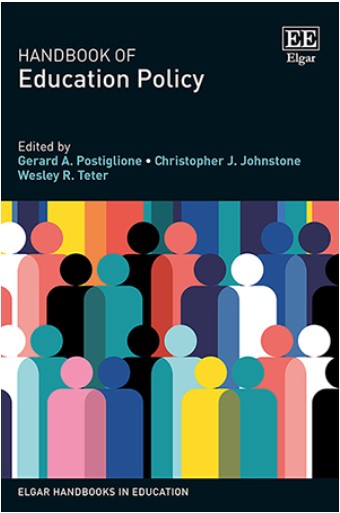
Edited by Gerard A. Postiglione (Professor Emeritus, Honorary Professor, The University of Hong Kong), Christopher J. Johnstone (Associate Professor, University of Minnesota, US) and Wesley R. Teter (Research Fellow, Center for Advanced School Education and Evidence Based Research, University of Tokyo, Japan)
Publisher: Edward Elgar Publishing
‘The new Handbook of Education Policy edited by Postiglione, Johnstone and Teter is a welcome addition to the academic literature on the transformation of education policy in the aftermath of the COVID-19 pandemic. The 22 chapters of this well-researched book give a comprehensive analysis of how education policy must adapt to a radically changed world. Through a skilful combination of thematic pieces and case studies from a large range of countries, the chapter authors challenge us to embrace new education policy concepts, such as public value governance and knowledge democratization, that can foster innovation and accountability in times of uncertainty. Gerard Postiglione, Christopher Johnstone, and Wesley Teter should be congratulated for this excellent scholarly contribution that has the potential of influencing policy makers all over the world to design and implement more sustainable and innovative education policies.’
– Jamil Salmi, Diego Portales University, Chile
‘This Handbook combines an up-to-date overview with theoretically-informed analysis of global education policies. It is erudite, insightful and original. It will be a vital resource for education policy researchers and an excellent starting point for students, in any location.’
– Stephen Ball, University College London, UK
This insightful Handbook is an essential guide to educational policy around the world. As shifting geopolitics, intensified climate change, and widening economic inequalities persist, the need for informed educational policy is critical.
Bringing together a unique collection of international case studies by scholars and practitioners from over twenty countries, the Handbook highlights how the contextual nature of educational policy and its implementation acknowledges both global trends and local nuance. Chapters explore key contemporary topics including the effects of the COVID-19 pandemic on international educational policy; opportunities for academic modernization in Ukrainian society; gender equality in Korean and Japanese universities; and inclusive education policies throughout the developing world, including India, South Africa, and Uruguay. It further discusses the ways in which governmental, non-governmental, and global education specialists are shaping new agendas focused on equity and responding to global crises.
Offering new perspectives on educational policy in a post-pandemic world, this comprehensive Handbook will be crucial reading for students and scholars of education policy, politics and public policy, sociology, and university management. It will also be beneficial for educational research associations and international development agencies, including UNESCO, the Asian Development Bank, and the World Bank.
Click here to access further details about the book.
Book review: Below is the book review for the “Handbook of Education Policy.” You can click on the image to view the full book review or simply click here to explore the book review in more detail.
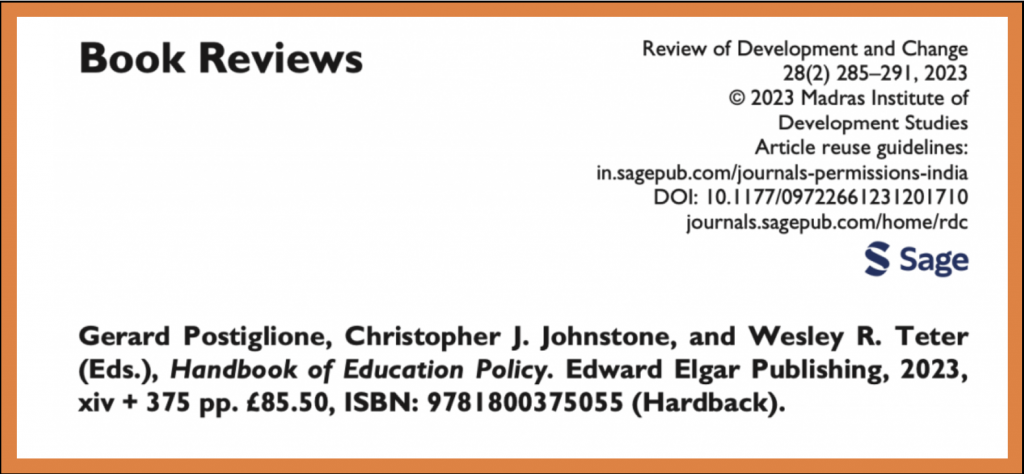
Tilak, J. B. (2023). Book review: Gerard Postiglione, Christopher J. Johnstone, and Wesley R. Teter (Eds.), Handbook of Education Policy
